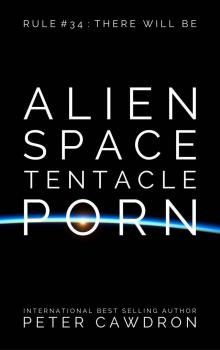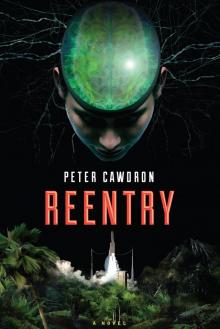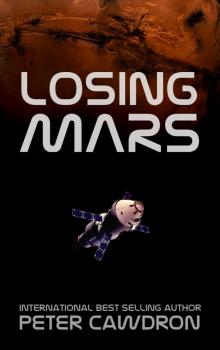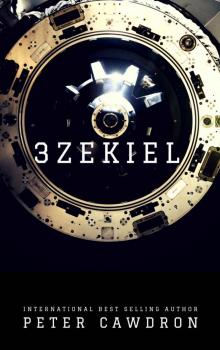- Home
- Peter Cawdron
But The Stars
But The Stars Read online
BUT THE STARS
Copyright © 2020
All rights reserved. The right of Peter Cawdron to be identified as the author of this work has been asserted in accordance with the Copyright, Designs and Patents Act 1988. All the characters in this book are fictitious, and any resemblance to actual persons living or dead is purely coincidental.
Cover image courtesy of the NASA Hubble Space Telescope image of NGC 121, a globular cluster in the Small Magellanic Cloud.
Epigraph
But the stars that marked our starting fall away.
We must go deeper into greater pain,
for it is not permitted that we stay.
Dante Alighieri,
Inferno, 1301 AD
Acheron (ˈækərən) Crew Manifest
Commander
Asiko Capidastrianani (Cap)
First Officer
Benson Gregor
Astrobiologist
Joh MacInnes (Mac)
Nuclear Physicist
Angela Darc (Angel)
Mission Specialist
Vichy Rossin
Exo-Geologist
Zoe Salenda
Mission Specialist
Nazim Hassrani (Naz)
Life Support
Margaret Smith (Mags)
Flight Surgeon
Dante Almani
Artificial Intelligence
Jeeves IV
Memories
“What do you remember?”
“Everything—and nothing at all,” Dante replies, running her hands through her hair, pulling at tangles and knots as she ruffles her long locks. She wonders what the male nurse standing before her is thinking. His words say one thing, his eyes another, but she doesn’t care for his gaze and tugs at her flight suit, straightening it, trying to deflect his attention. For God’s sake, she’s only just woken from a deep sleep.
Dante’s head is pounding. The crook of her arm aches from the wound left by the hibernation catheter that sustained her for the past few years, following the emergency evacuation from a frozen planet known only as P4. Lymph fluids, platelets and nutrients were meticulously exchanged while her mind was disengaged. The techs call it hyper-sleep, but it’s nothing like actual sleep. No dreams, no recharge, no newfound zest for life on waking, just the flicker of darkness. Count down from five, the artificial intelligence said, only she was gone around two, with one occurring almost three years later in orbit around yet another nameless star. Over a thousand days compressed into roughly five seconds. They say you don’t age in hyper-sleep. Anyone that believes that is a fool.
“When you’re ready,” the nurse says.
“Yes, of course.”
This particular male nurse is a fine specimen. Thick neck muscles, broad shoulders and pumped biceps struggle to hide beneath his crisp uniform. He has a chest like a whiskey barrel. For some, he’s a beefcake, but not for Dante. She’s always been more interested in what lies between someone’s ears than what hangs between their legs. To her, the nurse looks more like a porn star role playing some wild sexual fantasy than a medical professional, which has her on the verge of chuckling, but she keeps that thought to herself. Given the way he looked her over, she’d rather not encourage that kind of thinking.
The tiny digital pen in his hand is reminiscent of a piece of straw plucked from a bale of hay. It glides across a flex tablet leaving electronic ink in its wake. A combination of machine learning and artificial intelligence allows slight squiggles to be interpreted as words, hinging on their context, allowing him to write almost as fast as he can draw his hand across the flex. Letters appear in the wake of his pen, materializing where only their vague notion was a mere split-second earlier. To anyone from centuries past, it would be magic.
Like everyone in the 22nd century, the nurse has neural implants and doesn’t actually need to write, but it seems he’s like her. Dante prefers a moment between thought and action, an opportunity to crystalize her thinking. Instead of wrangling a stream of consciousness, which takes considerable sustained concentration, she’s old school. She would rather offer fewer words with more focus. Seeing someone else with the same approach is refreshing and she warms to him.
He rests the stylus against the edge of the wafer-thin plexiglass, having finished whatever note he was making. Dante wonders where she should start. Her lips are cracked, which causes her to grimace as she speaks.
“You want to know about the attack?” she asks, blinking under the bright lights.
“Start with First Contact,” he says. “I can lower the lights if that would help.”
“Yeah,” she replies, squinting. “And can I…”
“Have a drink of water?” he asks, finishing a question that trailed from her lips like a meteor burning through the night sky.
“Yeah.”
For now, he leaves her sitting perched on the side of a bed in the medical bay. The stiff, pressed sheets are white and clean. It feels wrong to rest her dirty hands on them so she cups her fingers in her lap. Her blue flight suit looks more like that of a greasy mechanic than an astronaut. Hyper-sleep chambers are functional, not aesthetic, and certainly not designed for comfort. They’re intended to keep people alive, not prepare them for a Vogue cover shoot. White suspension fluid has dried in patches on her trouser legs. Maybe she really is in a porn flick. That random, chaotic thought brings a wicked smile to her face and she lets out a solitary laugh, not that anyone hears it.
Dante is in no state to count the beds around her, but the ward is empty, which leaves her wondering about the rest of her crew. Perhaps they simply woke her first? But why not wake everyone at once? Are the others okay? Have there been complications? Fatalities? The act of turning her head to look around leaves her feeling dizzy and those thoughts escape her, dissipating like a mist.
Dante has no recollection of how she got to the medical bay, but waking from hyper-sleep can be disorienting. Medi-monitors sit idle at the head of each bed except hers, where a series of lines roll slowly across the screen. An erratic bouncing ball marks her heartbeat, while her temperature, blood pressure and oxygenation levels are slight squiggles by comparison. They’re roughly flat, undulating softly as the respiration line rises and falls in time with her chest.
“They’re all good,” a voice from behind her says. “You’re a little anemic, but otherwise in good shape. Nothing a shot of stems won’t fix.”
“Oh, yeah,” Dante says, turning to face a doctor—a young woman, too young. She could be in her teens. What the hell is she doing out here on the frontier? Perhaps she hides her age well.
Dante’s confused, but doesn’t know why. Nothing’s wrong, not that she can tell, and yet she feels uneasy. It’s nonsense. She’s been revived. It’s not uncommon to feel a little ill following a stretch in hyper-sleep. She distracts herself, saying, “We could have used this tech on the Acheron.”
The doctor looks down at her semi-transparent computerized flex sheet. “Oh, you were the flight surgeon?”
Not convincing. Dante doesn’t say anything, but she’s sure the doctor knew that before looking at the information sheet. Maybe she was simply double-checking, not wanting to act on an assumption. Why would she pretend not to know? It was the slight pause, the brief change in pitch, the uncertainty about what she was going to say that tipped off Dante.
“Our AI Jeeves did all the surgery, but yeah—that’s the title—or it was.”
“A lot has changed,” the woman says. Her tone becomes more relaxed. It’s as though she got something awkward out of the way.
Given all Dante’s been through, she’s wary of others—perhaps she’s a little too cautious. Maybe she’s reading too much into the innocent reply of a young doctor.
“Time dilation will do th
at,” Dante replies, agreeing with the doctor.
The doctor smiles. It’s fake, of course. A professional courtesy at best.
“How long were you out there?” the doctor asks, but doesn’t she know? She’s being polite, trying to be nice.
“By our reckoning? One way? Ah, roughly twenty-five years, I guess. Earthbound time was just over ninety years, if I remember correctly.”
“That’s pretty close,” she says, checking her notes. “You were clocked at 96C outbound by the deep space observatory.”
Dante’s head is pounding. Relativistic equations were never her thing. Normally, physicists refer to something like the subluminal speed of the Acheron as point ninety-six, so the doctor’s reply strikes her as a little strange. Being a doctor herself, though, she can relate to taking a few shortcuts with astrophysics nomenclature.
Dante feels compelled to explain, saying, “Our last jump was rough. Emergency evac. Not a lot of time to prep.”
“Well, you’re safe now,” the doctor replies.
“And you?” Dante asks.
“I was born out here. I’ve only ever been near-luminal on short hops. Nothing longer than six months.”
Born out here? Dante wonders just how much time has elapsed?
The muscular male nurse walks back in. From his slight pause by the door, he’s surprised to see the doctor standing there, which strikes Dante as strange. Where else should she be? He walks over and hands Dante a small, thermally insulated flask with the top removed.
“I’ve included some electrolytes and iron supplements to help with anemia.”
“Thank you,” she replies, raising the bottle to her lips and drinking heartily. Water trickles from her mouth, running down the side of her neck, but she doesn’t care. She didn’t realize just how parched she was until the water passed her lips. Strange, though, it tastes bland. Being an electrolyte mix, Dante’s expecting a slight sugar hit and the taste of dissolved salts, but the water is pleasant enough.
When she lowers the bottle, the doctor’s gone. That’s surprising. Dante didn’t see her leave. Surprising isn’t good.
Curious, she asks, “Where did she go?”
“The doctor will see you later,” the nurse replies. “Captain Befeck wants a full report.”
For a moment, Dante pauses. Why delegate the debriefing of a first contact survivor to a nurse? Why not the doctor? Why isn’t the captain down here? Or his second-in-command? Or a team of psychs? She shifts on the bed, getting comfortable. As if in response, the breeze spilling out of the air conditioning duct increases. It’s neither warm nor cool, which is annoying as it feels redundant. Oh, she longs for a refreshing breeze.
The nurse rests his thin tablet on a cart and pulls over a stool, rolling it across the deck. Her senses are heightened, which is unusual. Each bump and scratch on the floor imparts a slightly different tone from the wheels. She can hear the bearings as they turn. It could be a side effect of hyper-sleep, but she never felt like this after the much longer, outbound journey from Earth, only now after fleeing WISE 5571 and its mysterious planet P4.
Dante’s ears catch everything—the hollow sound of metal ringing as the steel frame of the cart flexes, the wheels running across the linoleum, the hum of the vents, the wheeze of pneumatics as the stool takes the nurse’s weight, the soft squelch of artificial leather as he sits on the thick padding.
“What are you doing in this region?” Dante asks, not entirely comfortable with the nurse and wanting some answers of her own.
“We’re running mining ops on local asteroids. Lots of microgravity missions. We picked up your distress call about nine months ago and have been on an intercept orbit ever since.”
“Huh?” Dante replies, noting the craft is as quiet as a grave—and not just the medical bay, there’s no noise coming from the corridor outside or the floor above. Back on the Acheron, every flex and creak spoke of the crew walking around on other decks.
Outside the station, pinpricks of light drift past. The host star must be off to the side as the light streaming in shifts across the walls, floor and ceiling like a sundial on steroids. At a guess, the craft is rotating once every couple of minutes, which gives her a comfortable sense of pseudo-gravity.
Based on how little her petite frame displaces the mattress, the craft must be running at less than one gee, which is about what the Acheron had when it opened its baffles to collect dark matter. Some stationmasters, prepping away teams for extended low-gee missions, will spin up their craft to 1.5 gees to boost red blood cell production and muscle strength in the weeks leading up to a low-gravity deployment. Perhaps that’s why this craft is so quiet. The operational teams must already be on site.
Dante’s surprised they left them out there instead of recalling them as those away crews will spend at least eighteen months in space without the health-inducing effects of gravity, be that artificial or real. They’ll be as weak as kittens by the time this ship swings back to collect them. Her mind is racing. Maybe there’s a nearby planet they can recover on, or a moon. Although this decision was in her favor, it seems like a really poor choice to leave most of the crew out there while embarking on a rescue mission. If she were the ship’s physician, she would have objected due to the risk of harm to their own crew. Dante would have demanded a recall before setting off on a rescue flight. Ah, she thinks too much.
From the curvature of the floor within medical, the station is probably about the same size as the observatories in the Oort Cloud—with a radius of roughly four hundred meters. Plenty of living space for several teams. So damn quiet.
“Contact?” the nurse asks, although it’s not actually a question. It’s a single word uttered with curiosity, but there it is, prompting her to begin.
“Ah, yes. First Contact.
“We’d been in the system for about four years and had established robotic monitoring stations on the moons of a couple of gas giants orbiting at 25 and 40 AU respectively, well outside the Goldilocks zone, but no dice. Nothing. No microbes. No complex molecules.
“We were sure the system was barren. On approach, the interstellar medium showed residual traces of a nearby supernova. Iron-60, stuff like that. Half-life calculations put the blast at approximately 200 million years ago. Cap thought it must have sterilized the planets. It was too far away to physically damage them, too close for anything to survive. We switched to looking for fossil remnants on the inner rocky planets. Outgassing on one of the planets suggested an active core, but the rest were dead.”
“What did you find?” the nurse asks.
Dante’s eyes glance up at the ceiling briefly before trailing around the room. Where have they hidden their microphones? Perhaps the flex is actively recording her.
“Oh, there was an unbalanced chemical equation in the atmosphere of P4. That got Cap’s attention.
“P4 was—is… ah, it’s in a relatively circular orbit just outside the habitable zone. It’s an ice world. Volcanism has kept a few patches of open water, but most of the land is buried by glaciers to a depth of several kilometers. We set down and began drilling, looking for subsurface lakes kept viable by geothermal warming.”
“And that’s when you found them?” he asks, yet again sounding like anything but a nurse. Dante’s confused. Is this actually the captain? Why would he role play? These thoughts distract her, but she continues recalling events, trying to keep the sequence straight.
“Not for several months.”
“Months?”
“Well, it was months before we noticed them.”
“I don’t understand,” he says, leaning forward and resting his arms on his knees. His eyes narrow as he focuses intently on her words.
“They noticed us straight away, but they use telepathy to hide, although it’s not what you think.”
“What do I think?” he asks.
“They can’t read minds, but they can manipulate thoughts. It’s like they can put concepts in, but they can’t take them out—not without us
noticing.”
“So they can influence you, but they can’t violate your freewill?”
“Exactly,” she says.
“I don’t understand. Your report said you were attacked.”
“Not all attacks are physical. Not always. At first, it was like they were probing, testing us, experimenting with us, trying different approaches, wanting to learn about us.”
“How?”
“Well… I was in the sickbay in orbit when I first heard of contact. Angel, Naz and Benson were on a short-duration surface op fixing robotic equipment. Zoe was operating the drill.
“Gravity down there is 2.2 gees—which is horrible to work in. Even within the confines of the shuttle craft, it felt as though you were carrying a piano around on your back.
“The team used exoskeletons while out on the surface to help counter the pull, but even with pressurized undergarments to boost blood circulation, it was torture.
“I went down a couple of times—never willingly. P4 was a shithole. It looked like hell had frozen over.
“Within a couple of months I was seeing members of the surface team present with minor kidney damage, brain lesions, burst pleura in the lungs, sinus problems, ringing in the ears, things like that. It was the sustained heavy gravity, so I instituted eight hour maximums for surface activity with a minimum sixteen hours to recuperate in orbit before subsequent shifts.
“Cap hated it. Wasted time. Wasted fuel. Not to mention it meant he couldn’t leave them down there and go off exploring the moons of P4 or any of the other planets, but doctor’s orders. You know.”
To her surprise, the nurse doesn’t acknowledge that point. Dante had expected it to elicit some camaraderie. Instead, the nurse asks, “When did you first see them?”

 Alien Space Tentacle Porn
Alien Space Tentacle Porn Reentry
Reentry Déjà Vu (First Contact)
Déjà Vu (First Contact) Wherever Seeds May Fall (First Contact)
Wherever Seeds May Fall (First Contact) But The Stars
But The Stars Trixie & Me
Trixie & Me Collision
Collision Jury Duty (First Contact)
Jury Duty (First Contact) Losing Mars
Losing Mars We Are Legion (van Helsing Diaries Book 2)
We Are Legion (van Helsing Diaries Book 2) Van Helsing's Diaries (Books 1-3): Nosferatu
Van Helsing's Diaries (Books 1-3): Nosferatu Shadows
Shadows 3zekiel (First Contact)
3zekiel (First Contact) Vampire (van Helsing Diaries Book 1)
Vampire (van Helsing Diaries Book 1) Xenophobia
Xenophobia All Our Tomorrows
All Our Tomorrows My Sweet Satan
My Sweet Satan Anomaly
Anomaly Monsters
Monsters